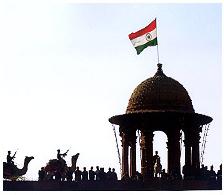The Indian Nuclear Deal

With the exception of a few die-hard protectionists, most Americans — this page included — applaud President Bush's desire to build a stronger relationship with India. The world's largest democracy, with one billion people, a fast-growing economy and a lively political system, is central to America's strategic interests.
But the notion of advice and consent must include the ability for lawmakers to balk when the price for something becomes too high. Such is the case now, as the Bush administration tries to get Congress to approve the very bad nuclear deal it has struck with India.
The pact would allow India to make an end run around the Nuclear Nonproliferation Treaty's basic bargain — that countries renounce nuclear weapons in exchange for the right to import sensitive nuclear technology to produce energy.
America has imposed nuclear export restrictions on India because India refuses to sign the treaty and has tested a nuclear device that uses materials and technology diverted from its civilian nuclear program.
In trying to give India a special exemption, Mr. Bush is threatening a carrot-and-stick approach that has been effective for more than 35 years. It is the legal basis on which Secretary of State Condoleezza Rice is trying to build a coalition against Iran's nuclear program. The treaty has persuaded countries like South Korea, Japan and Brazil to forgo nuclear weapons.
Senator Richard Lugar, chairman of the Foreign Relations Committee, asked Secretary Rice all the right questions during her testimony before the committee on Wednesday. Unfortunately he, along with Senator Joseph Biden, the panel's ranking Democrat, appear likely to support the deal. The central question, Mr. Lugar says, is, "How important is India?"
We beg to differ. The central question is not the importance of India, but rather the importance of deterring a global nuclear arms race.
- Editorial, The New York Times


